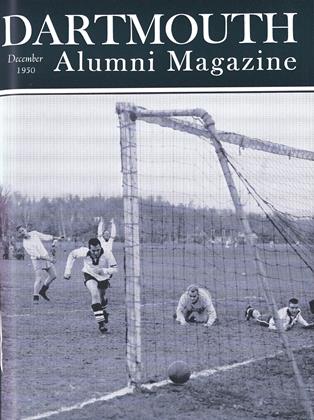On an atoll in the Pacific—Kapingamarangi in the Eastern Carolines—Dr. Ralph E. Miller '24, Professor of Pathology on leave from the Dartmouth Medical School, has been making a fascinating excursion into the past. Working for the Pacific Science Board with Dr. Kenneth P. Emory, ethnologist of the Bishop Museum in Honolulu, he has been testing the blood of natives on this small and isolated atoll to determine what mainland they originally came from. Dr. Miller began this project last June and will leave it as soon as the next boat comes by, in time to permit him to spend Christmas at home, he hopes.
Besides his main study, which has great significance for anthropologists, he has conducted with Dr. Emory a survey of health conditions and practices. As the island was converted to Christianity as recently as 1920, priests and magicians with their ancient formulae still serve as native doctors. Dr. Miller's medical knowledge has kept him busy attending the sick and helping out in emergencies. Western clothing is beginning to be adopted on the atoll but King David, the local ruler, has stated that he hopes this will turn out to be a fad.
Dr. Miller and his colleague were given the home of King David's son, Hetata, as their headquarters, with Hetata acting as their chief assistant. Most of their meals have been provided, ready to serve, by natives whom they have helped. Although the two men begin their day an hour before sunrise and do not finish working until three hours after sunset (there are no clocks), they find that the absence of whistles, radios, cars, trains and hurry brings them a sense of peace and rest which they wish they could take with them when they leave Kapingamarangi.
DR. RALPH E. MILLER '24, Dartmouth Medical School professor, with natives of the isolated Pacific atoll where as pathologist he is participating in a study to determine their mainland origin.
 View Full Issue
View Full Issue
More From This Issue
-
 Class Notes
Class Notes1918
December 1950 By ERNEST H. EARLEY, DONALD L. BARR, RICHARD A. HOLTON -
 Class Notes
Class Notes1935
December 1950 By HENRY R. BANKART JR., JOHN WALLACE, ROBERT w. NARAMORE -
 Class Notes
Class Notes1942
December 1950 By JAMES L. FARLEY, JOHN H. HARRIMAN, ADDISON L. WINSHIP II -
 Class Notes
Class Notes1923
December 1950 By TRUMAN T. METZEL, COLIN C. STEWART 3RD, LEON H. YOUNG JR -
 Class Notes
Class Notes1934
December 1950 By JOHN J. FOLEY, JOHN E. GILBERT, WILLIAM H. SCHERMAN -
 Article
ArticleContributions by Classes in the 1950 Alumni Fund Campaign
December 1950
Article
-
 Article
ArticleCHILD'S DESCRIPTION OF HANOVER IN YEAR 1782
February 1920 -
 Article
ArticleSing Out
November 1943 -
 Article
ArticleJohn F. Gile '16, Life Trustee, Dies in Hanover at Age of 61
March 1955 -
 Article
ArticleHappily Chastened
November 1975 -
 Article
ArticleAlumni News
July/Aug 2003 By Kelly Copper '93 -
 Article
ArticleFor the Marines
March 1945 By Pvt. Robert G. Marotz USMCR.

